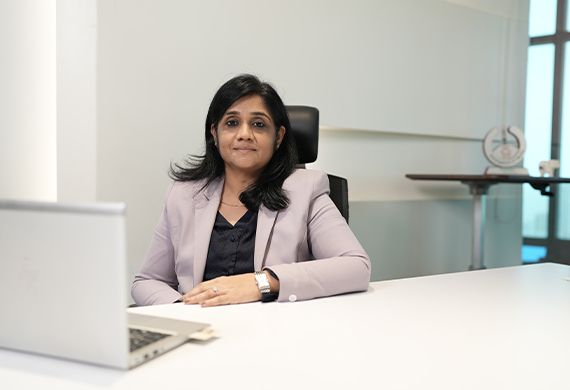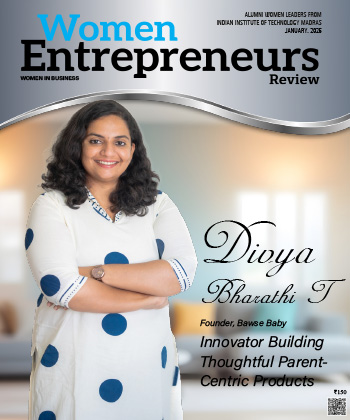
Building Scalable Leadership Pipelines for Women in Industry 4.0
By: Dr. Shilpa Kabra Maheshwari, EVP & Country Head, Siemens India
Dr. Shilpa Kabra Maheshwari is a seasoned HR leader with three decades of experience driving transformation, fostering diversity, and leading innovation across industries, with deep expertise in leadership development, change management, and building future-ready, people-centric organizations.
In an insightful interaction with Women Entrepreneurs Review, Shilpa shares her perspectives on evolving gender parity from compliance to growth strategy, reframing digital transformation for inclusion, and empowering mid-career women in traditional manufacturing through future-ready leadership pipelines.
How do you see gender parity initiatives evolving from being compliance-focused to becoming business-critical levers for innovation and growth in male-dominated industries?
While it is true that the volatile talent landscape in recent years has highlighted the critical contribution of gender equity initiatives by corporates, we have seen a conscious and concerted effort to bringing in more diversity in the talent pool. By encouraging more women to attune themselves to STEM topics (science, technology, engineering and mathematics) and having a supportive work environment, for instance, we have seen an increase in women colleagues in factories and project sites, typically seen as male-dominated. By removing unconscious bias against women candidates, we are opening up access to the entire available talent pool.
Siemens has a global Gender Equity Program that systematically drives greater gender equity across the company. This program ensures that we foster a culture that values diverse perspectives and inclusive behaviors, allowing us to leverage gender equity as a strategic advantage to drive innovation and growth.
As organizations navigate AI-led disruptions, how should women leaders in strategic HR roles reframe digital transformation as an enabler of inclusive organizational culture?
Digital transformation is not just about technology. It encompasses all aspects, including people, capabilities, processes, culture, strategy. We have observed an acceleration of technology adoption in recent times led by tangible benefits in productivity, quality, efficiency and flexibility among other benefits to enterprises. With the emergence of Artificial Intelligence applications, especially generative AI, people have a full array to tools to maximize their potential. We have use cases where AI applications together with other software-based automation have delivered increased collaboration, real-time analytics for performance improvement and decision making, remote monitoring of project sites and customer operations, etc. How are these enabling an inclusive organizational culture? Imagine a world without them and women professionals trying to make a mark in traditionally male-dominated functions are grappling with challenges that force people to rethink their career options.
With changing generational values, how can HR leaders design leadership pipelines that empower women at mid-career inflection points, especially within traditional manufacturing ecosystems?
Initiatives like a Women’s Network and peer coaching programs provide valuable support and mentorship for women returning to work or advancing their careers. At Siemens, we have a program called GLOW+ that helps women focus on personal and leadership development, helping women colleagues with technology and innovation backgrounds to build self-awareness and network with peers and senior management. These initiatives ensure that women have the resources and support needed to navigate mid-career transitions and achieve leadership roles.
In a landscape demanding agility and scale, how do you craft people strategies that integrate high-touch leadership development for women without compromising on speed and global scalability?
At Siemens, various talent development programs such as Siemens Leadership Excellence and NextGen Advanced Leadership Program offer structured development for global top leaders and promising talents. They involve hybrid development programs with diverse cohorts, working with executive coaches, Siemens business leaders, and proven business schools like INSEAD accelerate leadership capabilities while maintaining scalability. By leveraging these programs, Siemens ensures that women receive high-touch leadership development that aligns with the company's strategic priorities and global reach.
As hybrid and frontline workforce models rise, how should women in HR leadership advocate for equitable development opportunities across dispersed teams without creating inclusion fatigue?
By promoting flexible work arrangements and transparent promotion processes, HR leaders can ensure equitable development opportunities for all employees, regardless of their work model. The 4C approach—Commit, Connect, Collaborate, and Communicate—is central to an effective framework that comprises diversity, equity and inclusion strategies, initiatives, and goals as well as tools and resources to support employees in their daily interactions, decision-making, and leadership.
Most Viewed
- 1 Women's Health Startup HerMD Closing Doors Amid Industry Challenges
- 2 5 Famous Women in Indian Armed Forces
- 3 Saudi Women No longer Require Male Permission for Clothing Choices, says Prince MbS
- 4 Kolkata Medtech Startup Innovodigm Raises Rs 5.5 Crore Seed Funding Led by IAN Group
- 5 Yamunanagar's Kashish Kalra Honoured after Securing 111th Rank in UPSC Civil Services Exam
- 6 Madurai Appoints Its First Woman Corporation Head
- 7 IAS Vijayalakshmi Bidari Appointed as the new Nagpur Divisional Commissioner
- 8 American Entrepreneur Lucy Guo Overtakes T Swift to become Youngest Female Billionaire
- 9 ICC Women's World Cup 2025 Trophy Showcased at Indore's Holkar Stadium
- 10 Aparna Saxena's Beauty Venture AntiNorm Launches in India
- 11 Vidya Nataraj Co-Founded BlueStone Jewellery & Lifestyle files IPO
- 12 5 Women Freedom Fighters of India
- 13 Dr. G Krishnapriya appointed as CEO for Trichy
- 14 M3M & Sirona Partner to Introduce Menstrual Hygiene Vending Machines in 15 Locations
- 15 Punjab Govt launches SHE Cohort 3.0 Supporting Tech-led Women Startups
- 16 Indian origin Lawyer, Sweena Pannu appointed as the US New Superior Court Judge
- 17 The Aurora Tech Award recognizes 4 Indian Women-led Startups
- 18 Kerala's Republic Day parade featured an all-female tableau
- 19 Manisha Kabbur Becomes Karnataka's First Woman International Karate Coach
- 20 Director K. S. Ravikumar's Daughter Maalica Ravikumar Launches Life Coaching Company 'Evergrowth Academy' for Women
- 21 Leezu's Raises Pre-Seed Funding to Accelerate Growth in Sexual Wellness Industry
- 22 Sattu: Super-easy summer drink for PCOS gut healing
- 23 Swathi Nelabhatla creates Sitha App, India's First Women-Exclusive Gig Platform
- 24 7 Timeless Female Kathak Dancers & their Iconic Legacies
- 25 Meet 7 Iconic Women Architects of Modern India & their Most Impactful Work
- 26 This Woman-led Insuretech Startup is Helping Bridge the Education Financing Gap in India
- 27 Women Leaders Share Lessons Learnt from India Women's WC Win
- 28 5 Enterprising Women Founders Powering Singapore's Tech & Innovation Landscape
- 29 4 Women. 4 Stories. One Vision for Smarter, Stronger Healthcare
- 30 Global Gender Gap Narrows to 68.8%, But Full Equality 123 Years Away: WEF Report 2025
- 31 Changemakers: 7 Women Entrepreneurs Taking the Make in India Movement Forward
- 32 Meet Lucy Guo, The Youngest Self-Made Female Billionaire Disrupting Tech
- 33 How Women are Driving India's Festive Online Shopping Surge






